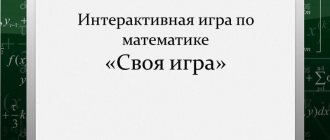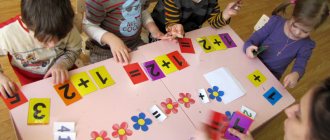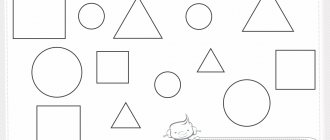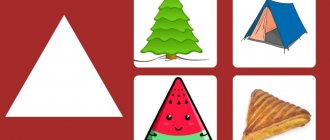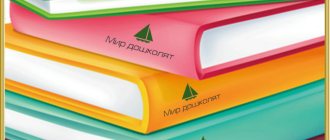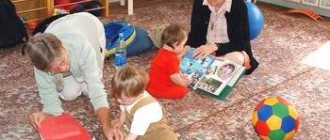Summary of an intellectual game in mathematics for children of the preparatory group of preschool educational institutions
Intellectual game “What?
Where? When?" in mathematics in kindergarten for older preschoolers Purpose: Generalization of children's knowledge of the material covered. Objectives: 1. Consolidate and justify answers to questions asked, knowledge about mathematical concepts. 2. Develop auditory and visual perception, curiosity, and communication skills. 3. To form the personal qualities of children: a sense of camaraderie, responsibility, empathy, mutual assistance, the ability to work in a team. 4. To instill in children an interest in activities and games, to induce an emotionally positive attitude, independence, goodwill, endurance, and the ability to listen to their comrades without interrupting them. Equipment: playing field, spinning top with an arrow, questions in envelopes, black box, individual sheets with tasks, pencils for each child; certificates, numbers, multimedia projector, video recording, markers, yellow tokens, globe. Preliminary work: Watching the game for preschoolers “What?
Where? When?”, conversation about the rules of the game, solving logical problems, addition and subtraction problems, measurement, asking riddles, games to develop attention and memory. Progress of the game:
Presenter: - Good afternoon, dear guests. Welcome to the intellectual game “What? Where? When?". Meet our experts. (The musical intro for the game “What, where, when?” sounds solemnly. Children enter the music room and line up in a semicircle in front of the game tables. Children read poetry. 1st child: Why is there solemnity around? Do you hear how quickly the speech stopped? to the queen of all sciences We begin this evening. 2nd child: It is no coincidence that she is given such honor. It is given to her to give answers. How to do a good calculation To build a building, a rocket 3rd child: There is a rumor about mathematics, That they put the mind in order , That's why people often say good words about her. Host: - Guys, look how many guests came to our intellectual game “What? Where? When?” to cheer for us. - Let's welcome our guests! (children clap) - We invite our teams take their places: 1 team “Planet of Knowledge”; 2 team “Knowledge”; 3 team “Math Patrol”; 4 team “Clever Guys”; 5 team of parents “Axiom”. Presenter: - Let me introduce you to our jury. Evaluate your game there will be parents (three people). Presenter: -And now, dear players, I will introduce you to the rules of the game: - you can discuss issues together with the whole team for 2 minutes; — the team captain or one of the players of this team, who is appointed by the team captain, can answer questions. — there should be silence in the hall during answers; — if the team is ready to answer ahead of time, it needs to raise its hand. — for violating the rules, the team receives a yellow warning sign; - for the correct answer - the team receives 1 point; Presenter: - Dear players! You must show erudition, intelligence and ingenuity, as well as be attentive and friendly in order to achieve victory. So we start the game. Host: Round 1! (The music “Gong, rotation of the top” sounds, the teacher rotates the top and moves the arrow to sector No. 1) Envelope No. 1 (the top has stopped) - Presenter: Attention to the screen! The middle school teacher plays with you. Let's watch the video question: -You have two drawings in front of you. You need to find ten differences between them and circle them. Presenter: -Teams, start the discussion. (2 min.) The discussion is over, announce the correct answer. Which team is ready to answer the question? Attention to the screen, correct answer. Host: Round 2! (The music “rotation of the top” sounds, the teacher rotates the top and moves the arrow to sector No. 2) Envelope No. 2 (the top has stopped) - Attention! Quick question! 1. Quick question for the Znayki team: “There are 8 people in the family: grandmother, grandfather, mother, father and children. How many children are there in the family? (4) 2. Quick question for the “Planet of Knowledge” team: “Chickens and dogs were walking in the yard. Misha counted their legs, it turned out to be 8. How many chickens were there, how many dogs?” (1 dog and 2 chickens) 3. Quick question for the “Math Patrol” team: “Alenka and Tanya have 4 candies each. Alena gave Tanya 2 candies. How many candies did each girl have? (2 and 6) 4. Quick question for the Smarties team: “How many ears do three mice have?” (6) 5. Quick question for the Axiom team: “There are 5 sons in the family. Each of them has one sister. How many children are there in the family? (6) Presenter: Round 3! (The music “rotation of the top” sounds, the teacher rotates the top and moves the arrow to sector No. 3 “Black box”) and the black box is brought in to the music. Attention, question: “He stands on one leg, spins and turns his head. He shows us countries, rivers, mountains, oceans” (Globe) Presenter: -Teams, start the discussion. -The discussion is over, announce the correct answer. -Which team is ready to answer the question? -Attention, correct answer. Host: Round 4! (The music “rotation of the top” sounds, the teacher rotates the top and moves the arrow to sector No. 4) Envelope No. 4 (the top has stopped) - Attention to the screen! Question from the teacher of the senior group (video recording) “Circle on the right only those geometric shapes from which the car is drawn.” Presenter: - Teams, start the discussion. — The discussion is over, announce the correct answer. — Which team is ready to answer the question? - Pay attention to the screen, correct answer. Host: Round 5! (The music “rotation of the top” sounds, the teacher rotates the top and moves the arrow to sector No. 5 “Treble Clef”) Envelope No. 5 (the top has stopped) Musical break (Musical physical education) Presenter: Round 6! (The music “rotation of the top” sounds, the teacher rotates the top and moves the arrow to sector No. 6) Envelope No. 6 (the top has stopped) - Attention, competition for captains: - Solve the examples and, using the letters next to the answer, decipher the word. 10-7= ... P 3+6= ... B 10-5= ... D 8-4= ... And Presenter: -Captains, begin the task. -Time is up, announce the correct answer. -Who is the first captain ready to answer the question? (if the team captain fails, the players help) -Attention to the screen, the correct answer. Host: Round 7! (The music “rotation of the top” sounds, the teacher rotates the top and moves the arrow to sector No. 7) Envelope No. 7 (the top has stopped) - Attention! Question from the teacher of the second junior group (video recording): “Here are mittens with examples. You need to solve the examples and use the answers to find a pair of each mitten” 3+4= … 9-2= 5+4= … 10-1= 3+3= … 8-2= 6+2= … 5+3= Presenter: — Teams, start discussing. — The discussion is over, announce the correct answer. — Which team is ready to answer the question? - Pay attention to the screen, correct answer. Host: Round 8! The music “rotation of the top” sounds, the teacher rotates the top and moves the arrow to sector No. Envelope No. 8 (the top has stopped) - Attention! Video question from a middle group teacher: “You have examples in front of you. Compare them using the signs >,< or =» 8-1 … 8+1 6+4 … 6+3 9-2 … 9-1 7+2 … 2+7 9+0 … 9-0 Presenter: - Teams , start the discussion. — The discussion is over, announce the correct answer. — Which team is ready to answer the question? - Pay attention to the screen, correct answer. Presenter: - Guys, our competition has come to the finals, we did our best! It's time to sum up the results and reward the smartest. While the jury sums up the results, listen to the poem Child: She teaches us to count and recognize figures. Explains numbers, signs, and how to solve problems! Know where is left and where is right Know the length and width. Understand the meaning: “equal”, “more”, “less”, height. Presenter: -And now we give the floor to our distinguished jury! The jury announces its decision and presents certificates to the teams. Presenter: - Well done! We congratulate you! -Experts, what do you remember most about the game today? -Did you like being experts? Thank you for an interesting game, and we will meet at the game next season. (Music "Final")
The music “rotation of the top” sounds, the teacher rotates the top and moves the arrow to sector No. Envelope No. 8 (the top has stopped) - Attention! Video question from a middle group teacher: “You have examples in front of you. Compare them using the signs >,< or =» 8-1 … 8+1 6+4 … 6+3 9-2 … 9-1 7+2 … 2+7 9+0 … 9-0 Presenter: - Teams , start the discussion. — The discussion is over, announce the correct answer. — Which team is ready to answer the question? - Pay attention to the screen, correct answer. Presenter: - Guys, our competition has come to the finals, we did our best! It's time to sum up the results and reward the smartest. While the jury sums up the results, listen to the poem Child: She teaches us to count and recognize figures. Explains numbers, signs, and how to solve problems! Know where is left and where is right Know the length and width. Understand the meaning: “equal”, “more”, “less”, height. Presenter: -And now we give the floor to our distinguished jury! The jury announces its decision and presents certificates to the teams. Presenter: - Well done! We congratulate you! -Experts, what do you remember most about the game today? -Did you like being experts? Thank you for an interesting game, and we will meet at the game next season. (Music "Final")
We recommend watching:
Mathematical dominoes for preschool children 5 - 7 years old Didactic game with your own hands for preschoolers from 4 years old to develop logical thinking Mathematical KVN in kindergarten for older preschoolers Quest game on FEMP on the topic “Signs of Spring” in the preparatory group of a preschool educational institution
Similar articles:
Mathematical role-playing game for children of the preparatory group
Mathematical fairy tale for children 5-7 years old
